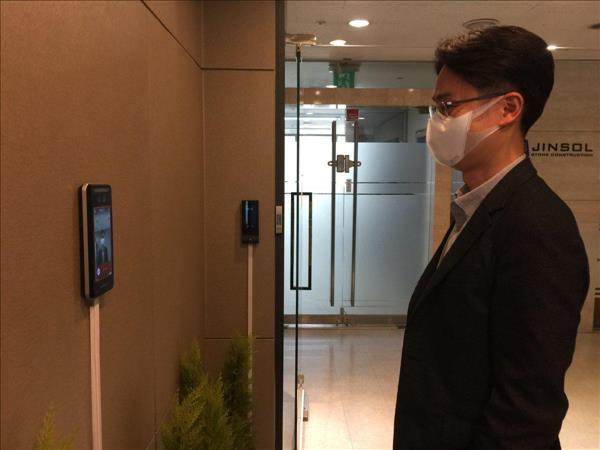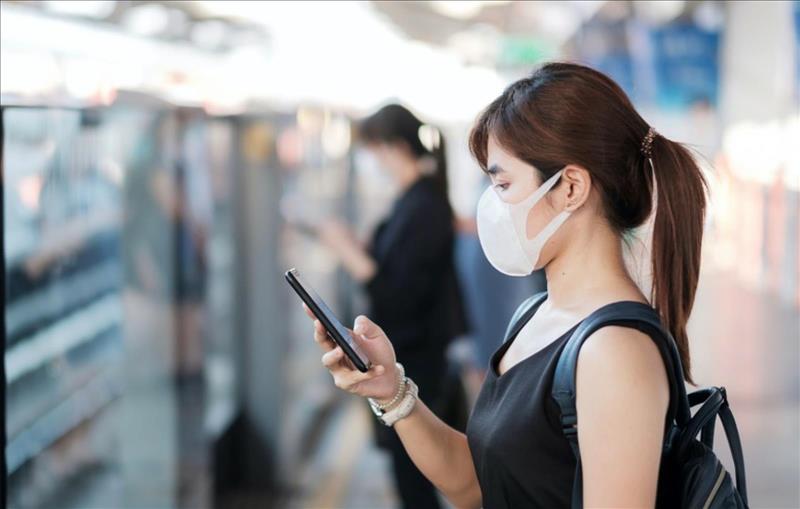
AI-backed camera systems the future of oversight
(MENAFN- Asia Times) PANGYO TECHNO VALLEY – The biometric security industry and related sectors are poised to surge on advances in artificial intelligence (AI) and machine learning, a senior industry executive told Asia Times.
Cameras empowered by these technologies will perform multiple roles as all-in-one entry, work, security and safety-monitoring mechanisms, driving convergence in these sectors.
'All you will need is a camera, going forward, for surveillance, alarms, intrusion – everything will be visual, based on AI and deep learning,' said Kim Han-chul, vice-president of Suprema, a leading South Korean security and biometrics business.
'We are doing access control with visual recognition – but now we are thinking total security.'
Currently, surveillance cameras generally require human monitoring, with film being played back when suspicious events occur. However, AI adds a 'brain' to the camera's visuals.
'If [cameras] are intelligent, they can detect intrusions, smoke, weapons and suspicious activities and alert people,' Kim said in an exclusive interview. 'If cameras are able to identify objects and motion, you pretty well have a human eye.'
This merger of roles under one technology has implications for the automated oversight of physical spaces of all kinds.
'Right now, access control, monitoring and so on are all different, but I see them converging,' Kim reckons. 'In the future, the camera – and its back-end system – will supersede everything.'

Suprema Vice President Kim Han-chul speaks to Asia Times. Photo: Andrew Salmon/Asia Times Building competencies, Korea-style
Kim should know. Suprema, a biometrics, security and identity solution provider, has sold to top brands and bodies in fields ranging from corporate to sport to transport to border control to government.
At home, the company's clients include national flagship Samsung Electronics (facial recognition and thermal camera temperature checks); national gateway Incheon International Airport (fingerprint recognition and RFID card solutions); Seoul Metro (fingerprint recognition, RFID cards); even the national government complex of Sejong City (fingerprint recognition, thermal camera temperature checks).
Abroad, they include Telefonica, South America's largest telco (fingerprint recognition); English Premier League football club Leicester City (fingerprint recognition), the German Federal Police (fingerprint recognition and criminal fingerprint registration) and the Russian Interior Ministry (fingerprint recognition and electronic passport fingerprint recognition).
Suprema, headquartered in the high-tech hub of Pangyo Techno Valley , south of Seoul's Gangnam district, was founded in 2000, originally as an online security business. Adding hardware to its software, it climbed the value ladder; from early card-based entry solutions to fingerprint-based solutions in 2004, and most recently, into high-end facial-recognition devices.
The corporate arm of Suprema is listed on the tech-heavy KOSDAQ market. It boasts a compound annual growth rate of 20%, from 2014-2020, and a current market value of $170 million.
Location and local competencies had much to do with the firm's ability to expand swiftly in the early 2000s.
'Korea was booming in mobile phones and so had many manufacturers and lots of competencies out there in hardware – LCDs, keyboards and so on,' Kim said. 'All the technologies we needed were available.'
Suprema leveraged this manufacturing cornucopia and added an element to its products that competitors had not – stylish design. It was, for example, the first player in the sector to add an LCD screen.
'We were able to bring those skill sets into our industry to make a consumer-looking device,' he said. That design-centricity, together with high performance and low manufacturing costs, were Suprema's winning factors, Kim said.
Its current portfolio encompasses access control systems, time and attendance solutions, fingerprint scanners, mobile authentication solutions, embedded fingerprint modules and facial recognition solutions.
With a global sales network in 140 countries, it claims to have 1 billion people using its products and to be the leading supplier of biometric access control products in the Europe/Middle East/African region.
Kim estimates that biometric solutions are around 15% of the business, the remainder being older-style electronic card entry and time-card systems. Of the biometric portion of the business, facial recognition is only about a fifth.
The company entered the sub-sector a decade ago. 'In 2010, there were not a lot of players doing facial,' Kim recalled. 'There were privacy concerns, and we would sell maybe one facial unit for 10 fingerprint units. It was not popular.'
Facial recognition problems included variables like lighting and environmental conditions, which can alter the look of facial features. As algorithms evolved, these variables became less problematic. But the sub-sector needed a boost.
In 2020 it got it – from a completely unexpected direction.

Two models of Suprema's latest product, the FaceStation F2. Note the thermal camera added to the unit on the right. Photo: Andrew Salmon/Asia Times The Covid boost
'Facial recognition gives you comfort as it is touchless,' Kim said. 'With the pandemic, facial recognition has been going up. We've never had this much demand.'
It's a demand that suits Suprema because high-security facial recognition solutions offer a value-add. The manufacturer's suggested retail price for a facial recognition system is $1,500, compared to fingerprint-based solutions, priced between $700 and $1,500.
'The pandemic was challenging,' Kim admitted. 'But it gave us a lot of opportunities.'
As economies and companies worldwide were infected by Covid-19 and investment dried up, Suprema took a punch to the guts. Annual revenues in 2020 were $76.5 million, down from a record $83.5 million in 2019. The big hit came in Q2 2020 but Suprema was back in recovery mode in Q4.
That recovery owed much to the company's latest product package. The FaceStation F2, a multi-modal entry terminal, offers mobile, fingerprint, card and facial authentication. The holy grail of the system is its facial recognition mode, which has a false acceptance ratio of one in 10 billion; it can even ID a face behind a mask.
However, Covid-19 forced the addition of a new module, delaying the launch, which had been set for launch in Q2 2020. Eventually, it went to market in September 2020.
The new module was a thermal camera added to the top of the unit, which checks the temperatures of those seeking access. The product has so far been picked up by a range of clients including Samsung Electronics, three Korean power utilities and one college.
'It is difficult to tell the future,' Kim said. 'But contactless and facial recognition are here to stay.'
Future facingIf Kim is proven correct, Suprema's shift into facial recognition – which requires quality cameras and the algorithms essential to upskill camera hardware – was, in hindsight, a brilliant move.
But it means Suprema's business model will have to change if it is to take advantage of the capabilities enabled by the new technologies and upcoming convergences. The sophisticated algorithms that enable recognition of human faces can be developed to recognize, for example, smoke and weapons – even suspicious body movements.
As these capabilities bounce sectoral boundaries, Suprema is seeking partnerships.
'When we look at the growth of Suprema over the last 20 years, everything was in-house, but I think we are at the point where, to scale-up further, we have to build synergies,' Kim said. 'We can't stay in access control while others are merging everything together. We have to partner with people that can bring us synergies.'

Suprema's latest facial recognition entry solutions are now sophisticated enough that they can ID a face behind a mask. Photo: Andrew Salmon/Asia Times
With AI-enabled cameras likely to replace today's smoke detectors as well as human screen watchers, a critical area is the surveillance field. 'In the area of surveillance, we will have to partner,' Kim said. 'Surveillance will be a key driver of security.'
There will also be less emphasis on the hardware/software product, and more on technology management, due to the vast amount of data AI-backed technologies need to process.
'It will be a completely service-based business, rather than a hardware business: It is the deep learning and the AI that we will focus on,' Kim said.
'This was a very conservative industry. There was not a lot of innovation for a long time but with the pandemic, contactless, AI and the Cloud, all these key words are catching the industry quicker than we expected.'

Legal Disclaimer:
MENAFN provides the
information “as is” without warranty of any kind. We do not accept
any responsibility or liability for the accuracy, content, images,
videos, licenses, completeness, legality, or reliability of the information
contained in this article. If you have any complaints or copyright
issues related to this article, kindly contact the provider above.

















Comments
No comment